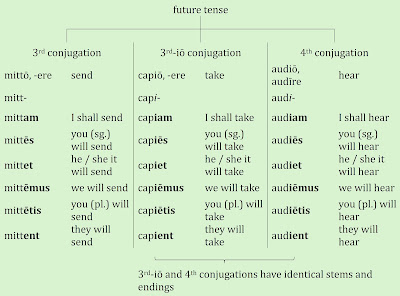This little text shows you both future tenses working
together. The verbs in bold are 3rd and 4th conjugation, the verbs in italics
1st conjugation.
Again, note the characteristic -bō / -bi- / -bu- of the 1st
(and 2nd) conjugation and, this time, the characteristic –(i)am / -(i)e/ē- of
the 3rd and 4th.
PŪBLIUS ET SERVIUS
[Chesnutt: the Road to Latin (1933)]
Pūblius et Servius
in hortō lūdunt. Prope puerōs parvōs Tullia cum amīcā Camillā sedet. Fēminae
puerōs spectant et audiunt.
“Nōn
semper,” inquit Pūblius, “parvī erimus. Tum nōs quoque cum Lūciō et Aulō
Rōmam ambulābimus.” Mox discipulī erimus et cotīdie ad lūdum properābimus,”
respondet Servius. “Quid in ludō agēs?” rogat Pūblius. “In lūdō
fābulās legam,” respondet Servius. “Tūne, Servī, semper
fābulās legēs?” Interdum lūdī magister fābulās leget.
Fābulās dē deis et deābus leget,” respondet Servius. “Nōs in lūdō
multās fābulās legēmus!” clāmat Pūblius.
“Quālēs fābulās,
meī fīliī, legētis?” rogat Tullia. “Fābulās dē bellīs et dē
aurigīs legēmus,” respondent Pūblius et Servius.
“Meī
fīliī parvī, Camilla,” inquit Tullia, “Libenter fābulās legent.
Fortasse domī fābulās nārrābunt.” “Parvī fīliī tuī sunt cārī,
Tullia. Fortasse ad vīllam meam mox venient. Nunc domum properābō.
Nōnne ad lectīcam, puerī, veniētis?” rogat Camilla. “Veniēmus sī
Tullia quoque veniet,” respondent puerī. “Cum fīliīs parvīs,”
inquit Tullia, “libenter veniam. Nōnne iterum, cāra Camilla, ad
vīllam veniēs?” “Mox veniam et fīliae meae
quoque venient,” respondent Camilla.
lectīca, -ae [1/f]: sedan; portable sofa / couch [see image]
quālis [masc. / fem.] quāle [neut.]: what kind of?
[1] Two future tense verbs are the focus of the text:
[i] legō, legere [3]: read
legam: I shall read
legēs: you (sg.) will read
leget: he / she / it will read
legēmus: we will read
legētis: you (pl.) will read
legent: they will read
[ii] veniō, venīre [4]: come
veniam: I shall come etc.
veniēs
veniet
veniēmus
veniētis
venient
[2] Note again the variation in tense usage between Latin
and English:
Veniēmus [future] ¦ sī Tullia quoque veniet [future]
We will come [future] ¦ if Tullia also comes [present]
[3] “Quid in ludō agēs?” rogat Pūblius.
agō, agere [3]: do
Publius asks a useful question: What will you do in
school? We will use that question later to do more practice of the future
tense.





























